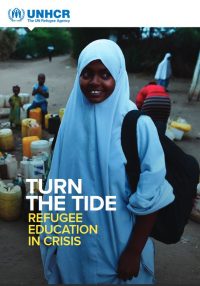Leading up to World Refugee Day on June 20, 2019, the German Federal Foreign Office (FFO), the German Academic Exchange Service (DAAD) and the United Nations High Commissioner for Refugees (UNHCR) jointly organized an international conference in Berlin on the topic “The Other 1 Percent – Refugees at Institutions for Higher Education Worldwide”. The two-day conference drew attention to the “Albert Einstein German Academic Refugee Initiative (DAFI)” and emphasized the importance of higher education for refugees.
 Currently only about 1% of the refugees worldwide are studying at a university level (versus 37% globally), while the number of out-of-school refugee children has increased by 500,000 in the last year alone to 4 million worldwide (see UNHCR’s report on refugees and education, Turn the Tide: Refugee Education in Crisis). The legally non-binding Global Compact on Refugees was adopted in December 2018 by the United Nations General Assembly. The Compact is intended to improve international cooperation on refugee matters, and improve the opportunities and outcomes of refugees in the labour market and in higher education.
Currently only about 1% of the refugees worldwide are studying at a university level (versus 37% globally), while the number of out-of-school refugee children has increased by 500,000 in the last year alone to 4 million worldwide (see UNHCR’s report on refugees and education, Turn the Tide: Refugee Education in Crisis). The legally non-binding Global Compact on Refugees was adopted in December 2018 by the United Nations General Assembly. The Compact is intended to improve international cooperation on refugee matters, and improve the opportunities and outcomes of refugees in the labour market and in higher education.
“Education is even more important to them than food”, reported Filippo Grandi, UN High Commissioner for Refugees, on the conversations he has had with refugees worldwide over the course of more than three decades. In Berlin, two days before World Refugee Day 2019, German Federal Foreign Minister Heiko Maas and Grandi opened the conference. University education in the first receiving countries is not only an opportunity for individuals to be perceived as human beings, said Maas, for “it offers hope for entire families of refugees and communities. Refugees who study are role models, enrichen their host country, and can one day possibly help rebuild their home country”.
The UN High Commissioner for Refugees insists that by 2030, 15% of refugees must have access to higher education. “We really owe it to those parents, families, communities, to those young people who are so eager to have an education. We need to restore in them a sense that life is great, that life has opportunities.”
Click here to read more about “The Other 1 Percent.”